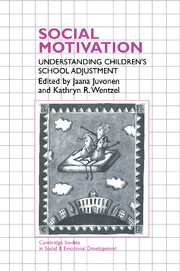Book contents
- Frontmatter
- Contents
- Contributors
- Preface
- Foreword
- 1 Introduction: New perspectives on motivation at school
- Part I Social motivation: Perspectives on self
- 2 Teacher and classmate influences on scholastic motivation, self-esteem, and level of voice in adolescents
- 3 Self-presentation tactics promoting teacher and peer approval: The function of excuses and other clever explanations
- 4 Social self-discrepancy: A theory relating peer relations problems and school maladjustment
- 5 Motivational approaches to aggression within the context of peer relationships
- 6 Motivational opportunities and obstacles associated with social responsibility and caring behavior in school contexts
- 7 Modeling and self-efficacy influences on children's development of self-regulation
- 8 Social motivation: Goals and social-cognitive processes. A comment
- Part II Social motivation: Perspectives on relationships
- Author index
- Subject index
3 - Self-presentation tactics promoting teacher and peer approval: The function of excuses and other clever explanations
Published online by Cambridge University Press: 22 October 2009
- Frontmatter
- Contents
- Contributors
- Preface
- Foreword
- 1 Introduction: New perspectives on motivation at school
- Part I Social motivation: Perspectives on self
- 2 Teacher and classmate influences on scholastic motivation, self-esteem, and level of voice in adolescents
- 3 Self-presentation tactics promoting teacher and peer approval: The function of excuses and other clever explanations
- 4 Social self-discrepancy: A theory relating peer relations problems and school maladjustment
- 5 Motivational approaches to aggression within the context of peer relationships
- 6 Motivational opportunities and obstacles associated with social responsibility and caring behavior in school contexts
- 7 Modeling and self-efficacy influences on children's development of self-regulation
- 8 Social motivation: Goals and social-cognitive processes. A comment
- Part II Social motivation: Perspectives on relationships
- Author index
- Subject index
Summary
When children first enter school, they learn a set of rules for appropriate social conduct. Some of these rules are specific for the setting, such as: “When you have a question you must raise your hand,” or that “For lunch, you need to line up with others.” Other enforced rules capture more general guidelines for prosocial behavior. Children are told to be polite, be considerate of one another, be willing to assist their classmates, and so on. When children adopt these norms and act in a socially responsible manner, they are approved by their teachers and accepted by their classmates (see for review Wentzel, 1991). Social approval is likely to enhance their feeling of belonging and relatedness, which in turn promotes their participation in various school activities and strengthens their identification with the school culture (c.f. Finn, 1989). When students feel that they are part of their school, they are also likely to be academically motivated and engaged (see Hymel, Colin, Schonert-Reichl, & McDougall, this volume).
Although many important social rules and norms for acceptable behavior are explicitly taught or at least are enforced by teachers (or parents) in early elementary grades, there is another set of rules for social conduct that also have important interpersonal as well as intrapersonal consequences. These rules, or more accruately psychological principles, are subtle and rarely (if ever) explicitly taught, yet most children seem to acquire them as they interact with others. Such psychological principles pertain to controlling and manipulating other people's reactions toward oneself. For example, if a child has hurt the feeling of a classmate, she needs to know how to make amends.
- Type
- Chapter
- Information
- Social MotivationUnderstanding Children's School Adjustment, pp. 43 - 65Publisher: Cambridge University PressPrint publication year: 1996
- 15
- Cited by

